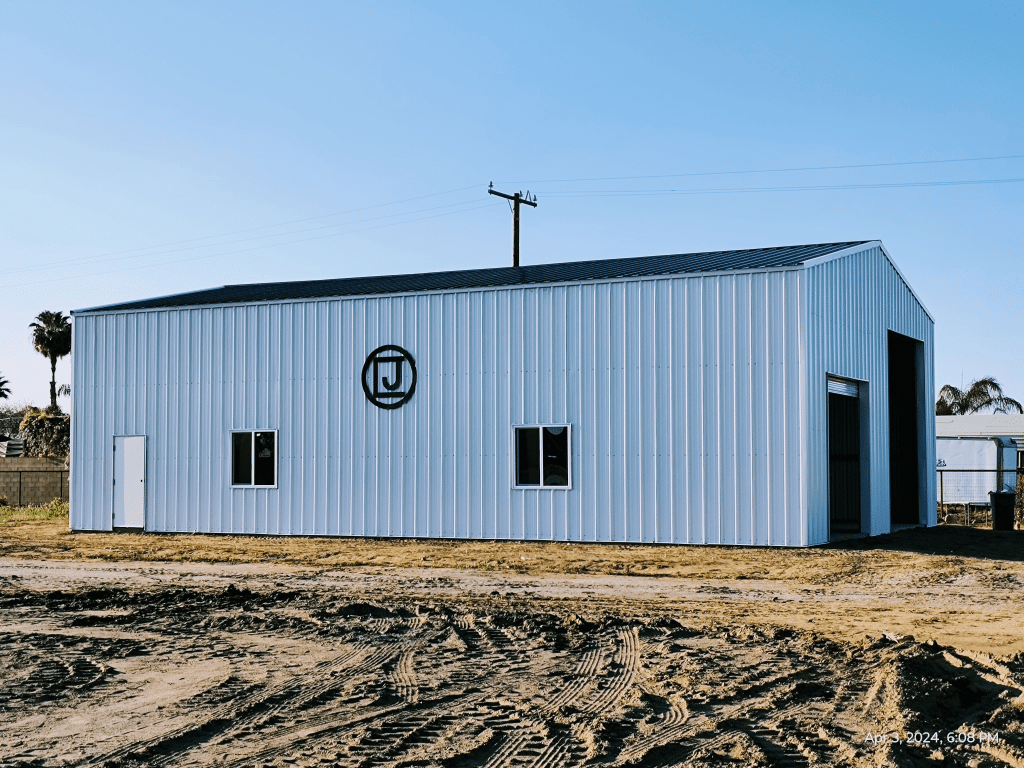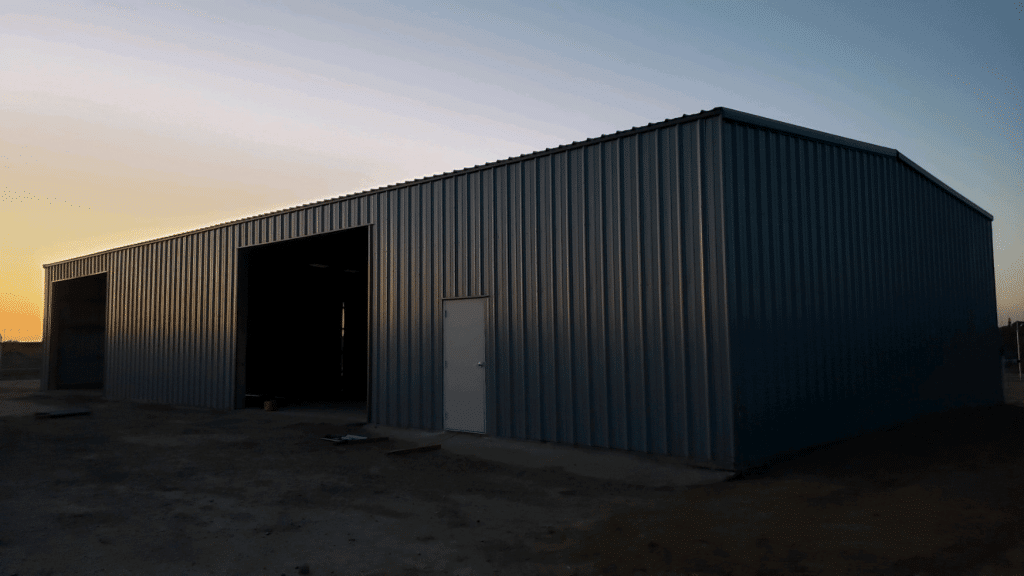The Long-Term Maintenance Savings of Steel Structures vs. Wood and Concrete

Steel buildings outperform traditional wood and concrete in durability, longevity, and cost-efficiency. In this blog, we’ll compare the long-term maintenance needs and expenses of steel versus traditional building materials, showing how businesses and homeowners can reduce repair costs, extend building lifespan, and eliminate common structural concerns.
Why Maintenance Matters
Whether you’re building a retail warehouse, a manufacturing facility, or a backyard workshop, the initial cost is only part of the equation. The real test of a structure’s value lies in its long-term performance and maintenance costs. For property owners and businesses alike, ongoing maintenance can represent a significant portion of a building’s total cost of ownership.
That’s where steel structures have a clear and measurable advantage. Unlike wood and concrete buildings, steel buildings resist the elements, pests, and decay without the need for frequent repairs or labor-intensive upkeep. And with Prime Manufacturing’s high-quality steel building systems, you’re investing in peace of mind for decades.
At Prime Manufacturing, we ensure that every steel building we produce uses the highest-grade American steel, specifically chosen for its durability and resistance to the elements. This means your building will stand the test of time and provide a long-term return on investment.
Steel vs. Wood vs. Concrete: A Maintenance Comparison
Let’s break down how each material holds up over time across several maintenance-critical areas:
Durability in Harsh Weather Conditions
Steel: Resistant to warping, cracking, and swelling. High wind and seismic tolerance, and less prone to structural failure due to snow loads or storms.
Wood: Vulnerable to warping, splitting, and rotting due to humidity and water exposure. Susceptible to damage from termites and carpenter ants.
Concrete: Durable in some climates, but prone to cracking due to temperature fluctuations and ground movement. Moisture can erode the structure over time if not properly sealed.
Pest Resistance
Steel: 100% impervious to termites, rodents, and other pests. No need for regular pest inspections or costly extermination treatments.
Wood: Highly susceptible to termite infestation, wood rot, and nesting rodents. Treatments are ongoing and costly.
Concrete: Generally pest-resistant, but can develop cracks or gaps that allow insect and rodent intrusion over time.
Fire Resistance
Steel: Non-combustible, fire-resistant, and often helps contain fire damage, minimizing repair costs and protecting inventory.
Wood: Flammable by nature. Fire can spread rapidly, causing total structural loss in many cases.
Concrete: Fire-resistant, but extreme temperatures can cause spalling and cracking.
Corrosion and Rot Prevention
Steel: With galvanization and protective coatings, steel resists corrosion. Prime Manufacturing’s buildings are designed to last in wet, coastal, and humid conditions.
Wood: Organic material that decays over time, especially in moisture-prone environments. Needs sealants, stains, and constant inspection.
Concrete: Porous and vulnerable to moisture intrusion. Over time, this leads to structural degradation without ongoing sealing and reinforcement.
Painting and Aesthetics Upkeep
Steel: Paint adheres well to treated steel, and color retention is strong. Prime’s custom buildings come with long-term warranties on color and finish.
Wood: Requires frequent painting, staining, or sealing. UV exposure and moisture cause visible degradation quickly.
Concrete: Often needs regular sealing or surface treatments to maintain aesthetic appeal. Paint on concrete can peel or fade rapidly in sun-exposed areas.
Maintenance Cost Breakdown Over 30 Years
| Building Material | Initial Cost | Average Annual Maintenance | Total 30-Year Maintenance Cost |
|---|---|---|---|
| Steel | Moderate | Low ($200–$500) | $6,000–$15,000 |
| Wood | Low | High ($2,000–$4,000) | $60,000–$120,000 |
| Concrete | High | Moderate ($1,000–$2,000) | $30,000–$60,000 |
This comparison highlights the long-term financial advantages of steel construction. What you save in maintenance can be reinvested into operations, upgrades, or your bottom line.
What That Means for B2B Clients
Warehouses, Manufacturing, and Logistics Hubs
Every day your facility is out of service due to maintenance is lost revenue. Steel buildings minimize downtime thanks to their reliability and minimal repair needs. Plus, steel structures can be easily expanded or modified to meet growing operational demands.
Agricultural Operations
Farmers benefit from steel barns, storage units, and livestock shelters that don’t require expensive roofing or wall repairs after storms or pest damage. Prime’s agricultural steel buildings are also easy to sanitize and maintain for compliance.
Retailers and Commercial Spaces
Steel buildings make ideal showrooms and stores. Lower maintenance means more consistent customer experiences, fewer insurance claims, and fewer closures for repairs.
What That Means for Homeowners
Whether you’re investing in a backyard metal garage, a guesthouse, or a multi-purpose workshop, a steel building ensures fewer surprises and repair bills. You don’t have to worry about leaks, rot, or pests. That peace of mind adds real property value and reduces long-term costs.
And with Prime’s custom 3D building design tools, homeowners can create beautiful, functional spaces that match their aesthetics and lifestyle goals.
Certifications and Warranty You Can Rely On
Not all steel buildings are created equal. Prime Manufacturing offers:
40-Year Limited Paint Warranty
Certified Engineering for Local Building Codes
High-Wind, Seismic, and Snow Load Ratings
Factory-Applied Protective Coatings
American-Made Steel for Maximum Strength
These certifications reinforce our commitment to quality and long-term value, giving you confidence that your investment is protected.
Environmental & Sustainability Benefits
Steel buildings are not just cost-effective—they’re environmentally smart.
Recyclability: Steel is 100% recyclable and often made with recycled materials.
Low Waste Construction: Prefabricated steel results in minimal job site waste.
Energy Efficiency: Proper insulation options help maintain temperature control, reducing HVAC costs.
These benefits align with ESG (Environmental, Social, and Governance) goals for commercial clients and resonate with eco-conscious homeowners.
Why Choose Prime Manufacturing?

We’ve built our reputation on designing and delivering steel buildings that outperform traditional construction in every category. When you partner with Prime, you’re getting more than just a building—you’re getting a reliable structure backed by engineering expertise, design flexibility, and exceptional customer support.
Our team supports you from concept to completion, ensuring your structure performs and saves you money year after year.
Long-Term Value Starts with the Right Material
Choosing steel means choosing lower maintenance, fewer headaches, and more savings—year after year. Whether you’re building for business, agriculture, or personal use, Prime Manufacturing’s custom steel buildings are the smart long-term investment. Let’s build something that lasts—without the constant upkeep. Contact Prime Manufacturing today to get started with a custom quote or 3D design.
